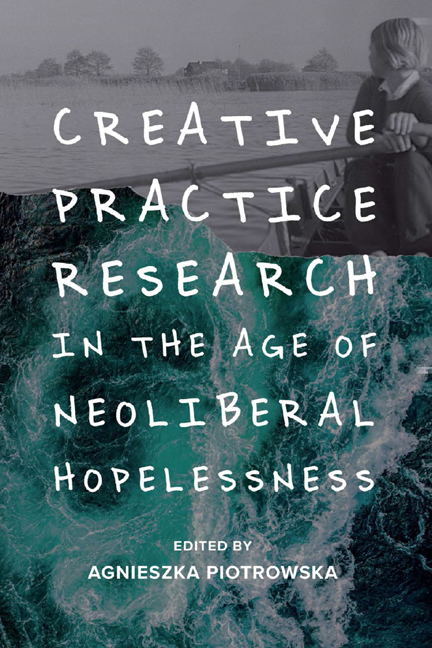Book contents
- Frontmatter
- Contents
- List of Figures
- Notes on Contributors
- Acknowledgements
- Preface: Life in the Post Pandemic Age
- Dedication
- 1 Introduction: Complexities, Compromises and Complicities
- 2 Against the Grain: Women Film Practitioners and Theorists Talk Creative Practice and Theory
- 3 Married to the Eiffel Tower: Notes on Love, Loss and Knowledge
- 4 Creativity and Neoliberalism: Between Autonomy, Resistance and Tactical Compliance
- 5 Tactical Compliance and the Persistence of Elsaesser
- 6 Storytelling and Game Playing
- 7 Autonomy and the Other Woman: Queer Active Agency and Postcolonial Expectations
- 8 From Neolithic to Neoliberal
- 9 First-person Expression on ‘Non-Western’ Screens: China as a Case Study
- 10 Scholarly Exploration of the Creative Process: Integrating Film Theory and Practice
- 11 Teaching Practice as Theory: Guerrilla Filmmaking
- 12 Baits of Falsehood: The Role of Fiction in Documentary or From Untheorised Practice to Unpractised Theory
- 13 Repented: A Creative Intersemiotic Translation
- Notes on Repented
- 14 How do you see me? The Camera as Transitional Object in Diasporic, Domestic Ethnography
- 15 ‘Shut Your Hole, Girlie. Mine's Making Money, Doll’: Creative Practice-Research and the Problem of Professionalism
- 16 Feminist ‘Pensive-creative Praxis’ and Irigaray: A Porous, Dialogical Encounter
- 17 The Paths of Creation, or How Can I Help my Dybbouk to Get Out of Me?
- 18 ‘We Want to Kill Boko Haram’: Reflections on the Photographic Representation of Children in a Displacement Camp
- 19 Between ‘Counter-movement’ (Ingold) and ‘Living with Ghosts’ (Demos)
- 20 Screen Memories: A Video Essay on Smultronstället/Wild Strawberries
- Index
17 - The Paths of Creation, or How Can I Help my Dybbouk to Get Out of Me?
Published online by Cambridge University Press: 17 October 2020
- Frontmatter
- Contents
- List of Figures
- Notes on Contributors
- Acknowledgements
- Preface: Life in the Post Pandemic Age
- Dedication
- 1 Introduction: Complexities, Compromises and Complicities
- 2 Against the Grain: Women Film Practitioners and Theorists Talk Creative Practice and Theory
- 3 Married to the Eiffel Tower: Notes on Love, Loss and Knowledge
- 4 Creativity and Neoliberalism: Between Autonomy, Resistance and Tactical Compliance
- 5 Tactical Compliance and the Persistence of Elsaesser
- 6 Storytelling and Game Playing
- 7 Autonomy and the Other Woman: Queer Active Agency and Postcolonial Expectations
- 8 From Neolithic to Neoliberal
- 9 First-person Expression on ‘Non-Western’ Screens: China as a Case Study
- 10 Scholarly Exploration of the Creative Process: Integrating Film Theory and Practice
- 11 Teaching Practice as Theory: Guerrilla Filmmaking
- 12 Baits of Falsehood: The Role of Fiction in Documentary or From Untheorised Practice to Unpractised Theory
- 13 Repented: A Creative Intersemiotic Translation
- Notes on Repented
- 14 How do you see me? The Camera as Transitional Object in Diasporic, Domestic Ethnography
- 15 ‘Shut Your Hole, Girlie. Mine's Making Money, Doll’: Creative Practice-Research and the Problem of Professionalism
- 16 Feminist ‘Pensive-creative Praxis’ and Irigaray: A Porous, Dialogical Encounter
- 17 The Paths of Creation, or How Can I Help my Dybbouk to Get Out of Me?
- 18 ‘We Want to Kill Boko Haram’: Reflections on the Photographic Representation of Children in a Displacement Camp
- 19 Between ‘Counter-movement’ (Ingold) and ‘Living with Ghosts’ (Demos)
- 20 Screen Memories: A Video Essay on Smultronstället/Wild Strawberries
- Index
Summary
For a long time, I have been maintaining some sort of schizophrenia, divided between my artistic work, and my research and teaching theatre at University. As long as I can assault theatrical works or literary works to adapt, sometimes translate, and even play when it's possible, but always direct, my artistic gesture has been and will remain for me an art of living. This is the only way I can assume my human condition. I shaped my identity in this artistic gesture: first as a daughter (my father was an architect and my mother an actress in her youth), as a woman, as a Jew, as a citizen, and also – but it took me a long time to realise it – as a university researcher. My artistic creation accompanied me at all times, at all stages of my life, drawing an evolutive path that the research at the University could help me to write down.
Would we say, as Pablo Picasso did in 1926: ‘I don't search, I find’ (2014) or on the contrary in theatre: ‘I don't find, I search’? Nobody can ever say in theatre that he has found; we are always searching. However, creation is not research and of course research is not creation. Research is feeding creation which is feeding research. So we will try to follow the paths of creation, full of sound and fury, of laugh and work, to try to answer the essential question: ‘Was the chicken before the egg or the egg before the chicken?’
This is a fundamentally circular question that gives to research and creation, to both of them, an absolutely wonderful status of uselessness in our neoliberal society – to integrate the subject – while this uselessness is really a beginning of hope: the soul supplement that we need in order to live and not only to survive. Let's say that we are the cherry on the cake – as art could be perceived – but the cherry gives its flavour to the cake, gives the real taste of it.
The second point that comes after uselessness is the ability in creative practice research to give objectivity to our totally subjective artistic point of view. Let's ask how research, in the area of creative practice research, might be necessarily autobiographic.
- Type
- Chapter
- Information
- Creative Practice Research in the Age of Neoliberal Hopelessness , pp. 258 - 270Publisher: Edinburgh University PressPrint publication year: 2020



